America's Stance on Universal Healthcare: An Essay Analysis
VerifiedAdded on 2020/04/15
|5
|1180
|386
Essay
AI Summary
This essay delves into the contentious debate surrounding universal healthcare in the United States, examining the arguments both for and against its implementation. The author begins by outlining the concept of universal healthcare and its potential benefits, such as equal access to care and improved public health outcomes, drawing comparisons to successful models in countries like Canada and Germany. The essay then presents the rationale for why America has not adopted a universal healthcare system, including cultural factors, political challenges, and the influence of interest groups. It highlights concerns about longer waiting times, reduced competition, and the unique aspects of American political and cultural landscapes. The author emphasizes the need to consider the economic implications and the potential for incremental changes to improve healthcare outcomes for the population, acknowledging that the US is the only industrialized nation without universal health coverage, yet it has the highest healthcare spending in the world.
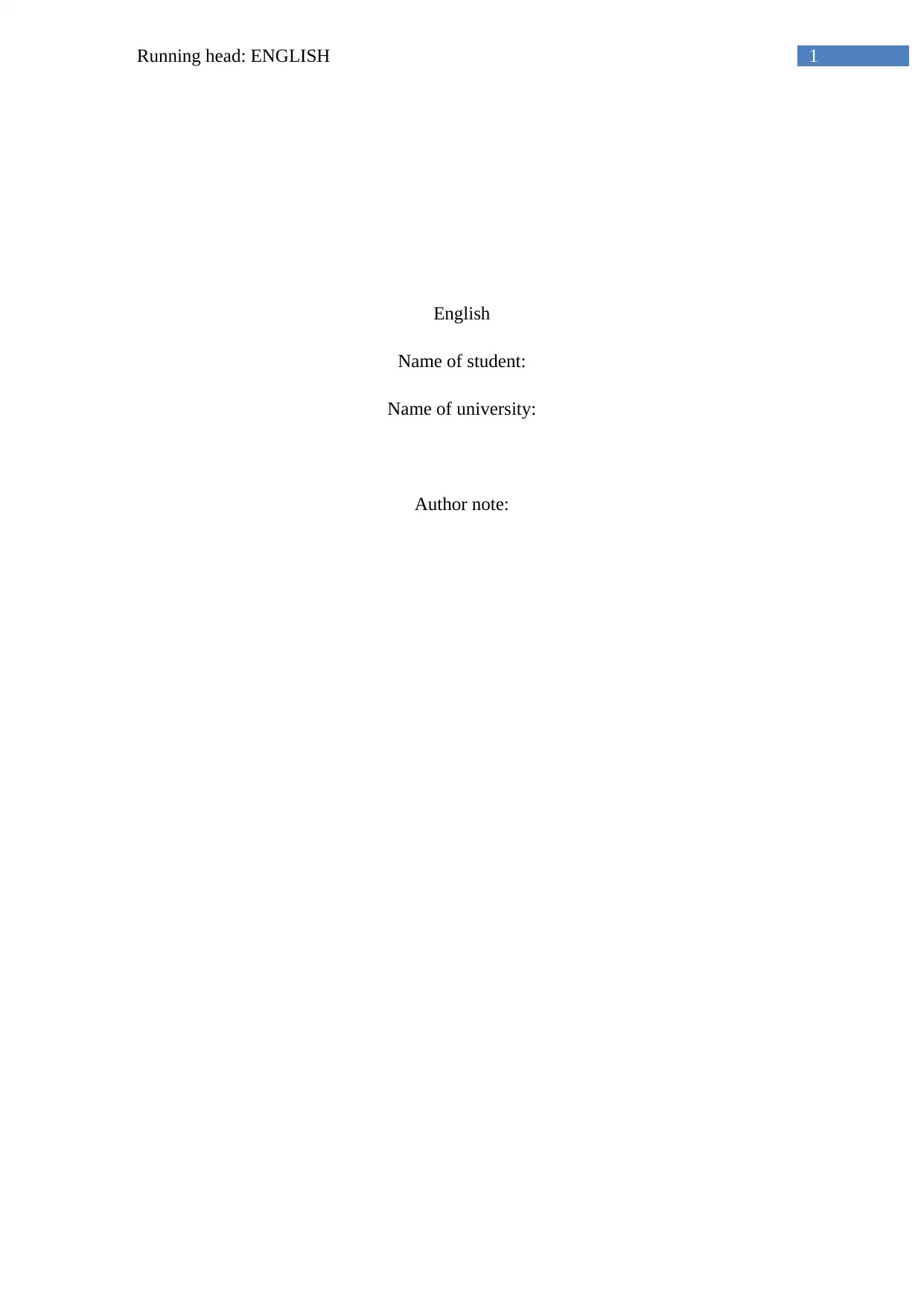
1Running head: ENGLISH
English
Name of student:
Name of university:
Author note:
English
Name of student:
Name of university:
Author note:
Paraphrase This Document
Need a fresh take? Get an instant paraphrase of this document with our AI Paraphraser
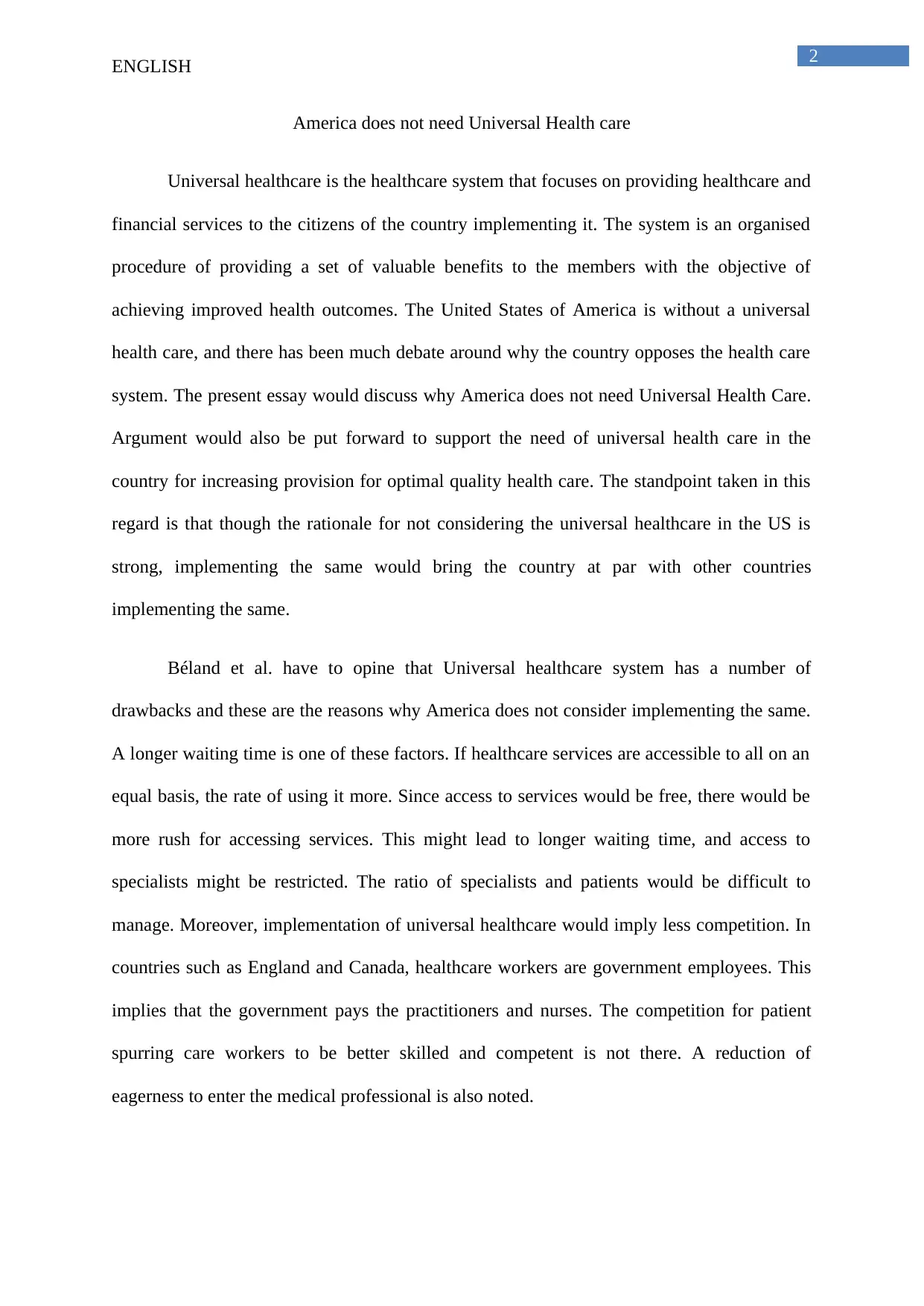
2
ENGLISH
America does not need Universal Health care
Universal healthcare is the healthcare system that focuses on providing healthcare and
financial services to the citizens of the country implementing it. The system is an organised
procedure of providing a set of valuable benefits to the members with the objective of
achieving improved health outcomes. The United States of America is without a universal
health care, and there has been much debate around why the country opposes the health care
system. The present essay would discuss why America does not need Universal Health Care.
Argument would also be put forward to support the need of universal health care in the
country for increasing provision for optimal quality health care. The standpoint taken in this
regard is that though the rationale for not considering the universal healthcare in the US is
strong, implementing the same would bring the country at par with other countries
implementing the same.
Béland et al. have to opine that Universal healthcare system has a number of
drawbacks and these are the reasons why America does not consider implementing the same.
A longer waiting time is one of these factors. If healthcare services are accessible to all on an
equal basis, the rate of using it more. Since access to services would be free, there would be
more rush for accessing services. This might lead to longer waiting time, and access to
specialists might be restricted. The ratio of specialists and patients would be difficult to
manage. Moreover, implementation of universal healthcare would imply less competition. In
countries such as England and Canada, healthcare workers are government employees. This
implies that the government pays the practitioners and nurses. The competition for patient
spurring care workers to be better skilled and competent is not there. A reduction of
eagerness to enter the medical professional is also noted.
ENGLISH
America does not need Universal Health care
Universal healthcare is the healthcare system that focuses on providing healthcare and
financial services to the citizens of the country implementing it. The system is an organised
procedure of providing a set of valuable benefits to the members with the objective of
achieving improved health outcomes. The United States of America is without a universal
health care, and there has been much debate around why the country opposes the health care
system. The present essay would discuss why America does not need Universal Health Care.
Argument would also be put forward to support the need of universal health care in the
country for increasing provision for optimal quality health care. The standpoint taken in this
regard is that though the rationale for not considering the universal healthcare in the US is
strong, implementing the same would bring the country at par with other countries
implementing the same.
Béland et al. have to opine that Universal healthcare system has a number of
drawbacks and these are the reasons why America does not consider implementing the same.
A longer waiting time is one of these factors. If healthcare services are accessible to all on an
equal basis, the rate of using it more. Since access to services would be free, there would be
more rush for accessing services. This might lead to longer waiting time, and access to
specialists might be restricted. The ratio of specialists and patients would be difficult to
manage. Moreover, implementation of universal healthcare would imply less competition. In
countries such as England and Canada, healthcare workers are government employees. This
implies that the government pays the practitioners and nurses. The competition for patient
spurring care workers to be better skilled and competent is not there. A reduction of
eagerness to enter the medical professional is also noted.
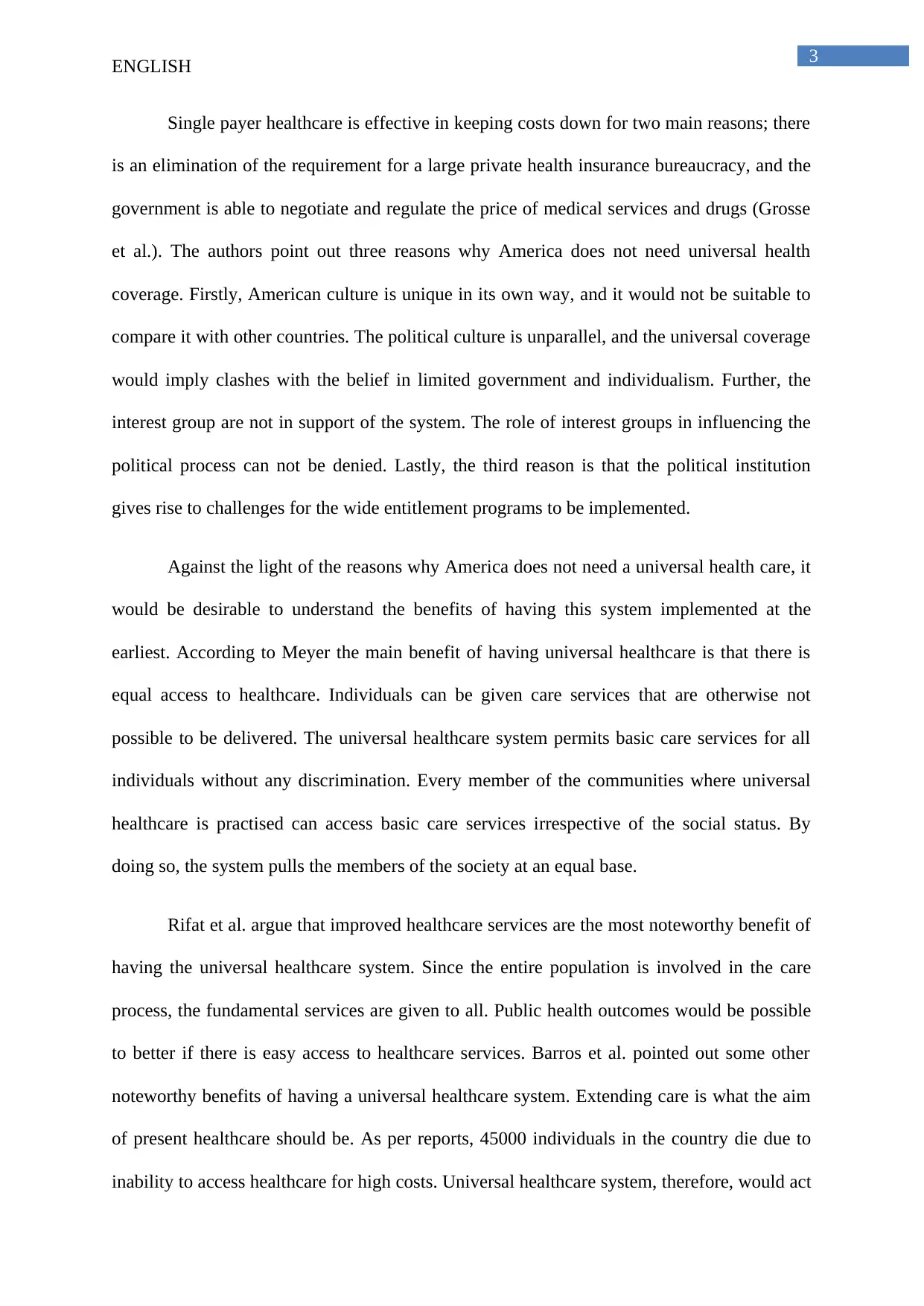
3
ENGLISH
Single payer healthcare is effective in keeping costs down for two main reasons; there
is an elimination of the requirement for a large private health insurance bureaucracy, and the
government is able to negotiate and regulate the price of medical services and drugs (Grosse
et al.). The authors point out three reasons why America does not need universal health
coverage. Firstly, American culture is unique in its own way, and it would not be suitable to
compare it with other countries. The political culture is unparallel, and the universal coverage
would imply clashes with the belief in limited government and individualism. Further, the
interest group are not in support of the system. The role of interest groups in influencing the
political process can not be denied. Lastly, the third reason is that the political institution
gives rise to challenges for the wide entitlement programs to be implemented.
Against the light of the reasons why America does not need a universal health care, it
would be desirable to understand the benefits of having this system implemented at the
earliest. According to Meyer the main benefit of having universal healthcare is that there is
equal access to healthcare. Individuals can be given care services that are otherwise not
possible to be delivered. The universal healthcare system permits basic care services for all
individuals without any discrimination. Every member of the communities where universal
healthcare is practised can access basic care services irrespective of the social status. By
doing so, the system pulls the members of the society at an equal base.
Rifat et al. argue that improved healthcare services are the most noteworthy benefit of
having the universal healthcare system. Since the entire population is involved in the care
process, the fundamental services are given to all. Public health outcomes would be possible
to better if there is easy access to healthcare services. Barros et al. pointed out some other
noteworthy benefits of having a universal healthcare system. Extending care is what the aim
of present healthcare should be. As per reports, 45000 individuals in the country die due to
inability to access healthcare for high costs. Universal healthcare system, therefore, would act
ENGLISH
Single payer healthcare is effective in keeping costs down for two main reasons; there
is an elimination of the requirement for a large private health insurance bureaucracy, and the
government is able to negotiate and regulate the price of medical services and drugs (Grosse
et al.). The authors point out three reasons why America does not need universal health
coverage. Firstly, American culture is unique in its own way, and it would not be suitable to
compare it with other countries. The political culture is unparallel, and the universal coverage
would imply clashes with the belief in limited government and individualism. Further, the
interest group are not in support of the system. The role of interest groups in influencing the
political process can not be denied. Lastly, the third reason is that the political institution
gives rise to challenges for the wide entitlement programs to be implemented.
Against the light of the reasons why America does not need a universal health care, it
would be desirable to understand the benefits of having this system implemented at the
earliest. According to Meyer the main benefit of having universal healthcare is that there is
equal access to healthcare. Individuals can be given care services that are otherwise not
possible to be delivered. The universal healthcare system permits basic care services for all
individuals without any discrimination. Every member of the communities where universal
healthcare is practised can access basic care services irrespective of the social status. By
doing so, the system pulls the members of the society at an equal base.
Rifat et al. argue that improved healthcare services are the most noteworthy benefit of
having the universal healthcare system. Since the entire population is involved in the care
process, the fundamental services are given to all. Public health outcomes would be possible
to better if there is easy access to healthcare services. Barros et al. pointed out some other
noteworthy benefits of having a universal healthcare system. Extending care is what the aim
of present healthcare should be. As per reports, 45000 individuals in the country die due to
inability to access healthcare for high costs. Universal healthcare system, therefore, would act
⊘ This is a preview!⊘
Do you want full access?
Subscribe today to unlock all pages.

Trusted by 1+ million students worldwide
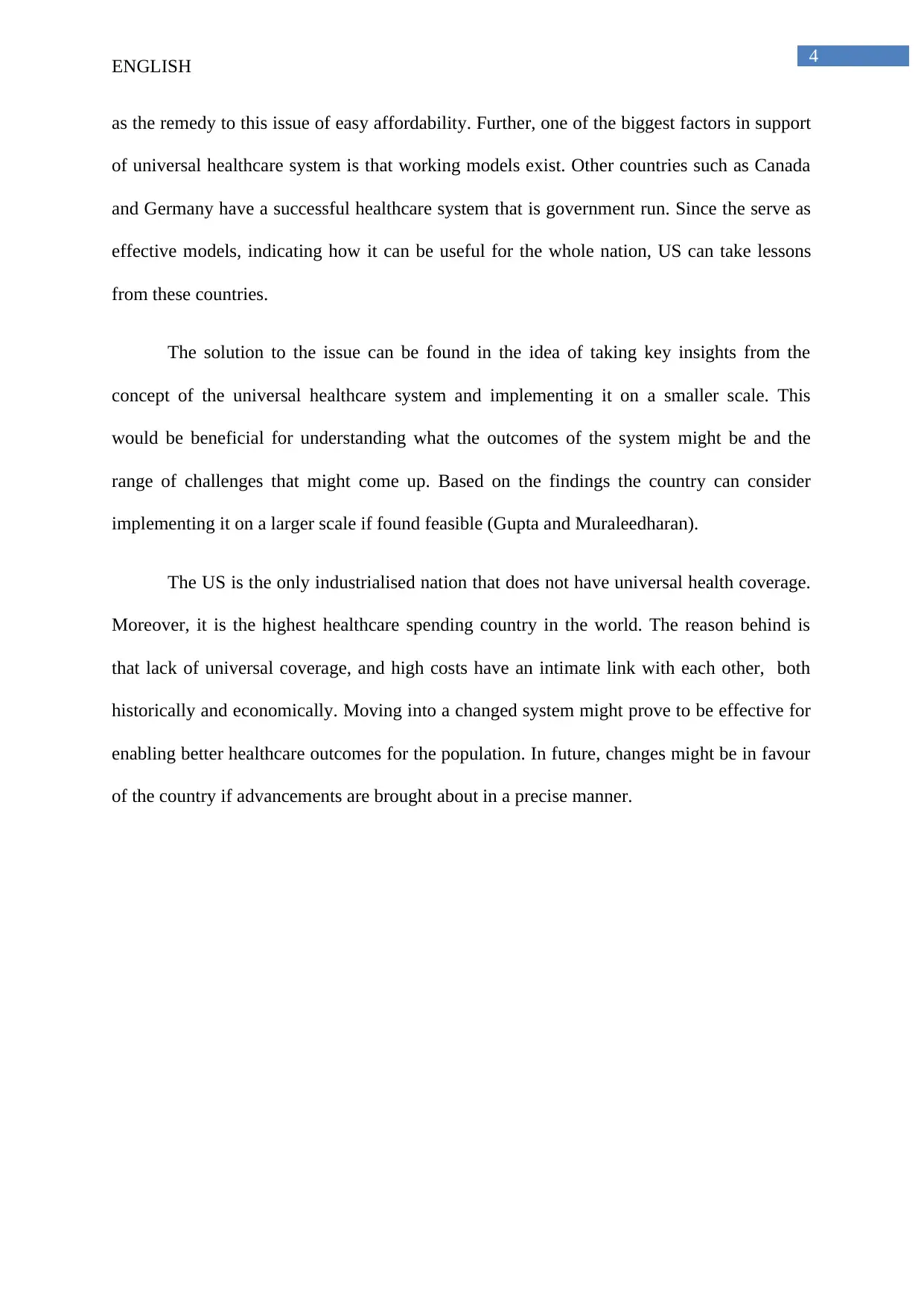
4
ENGLISH
as the remedy to this issue of easy affordability. Further, one of the biggest factors in support
of universal healthcare system is that working models exist. Other countries such as Canada
and Germany have a successful healthcare system that is government run. Since the serve as
effective models, indicating how it can be useful for the whole nation, US can take lessons
from these countries.
The solution to the issue can be found in the idea of taking key insights from the
concept of the universal healthcare system and implementing it on a smaller scale. This
would be beneficial for understanding what the outcomes of the system might be and the
range of challenges that might come up. Based on the findings the country can consider
implementing it on a larger scale if found feasible (Gupta and Muraleedharan).
The US is the only industrialised nation that does not have universal health coverage.
Moreover, it is the highest healthcare spending country in the world. The reason behind is
that lack of universal coverage, and high costs have an intimate link with each other, both
historically and economically. Moving into a changed system might prove to be effective for
enabling better healthcare outcomes for the population. In future, changes might be in favour
of the country if advancements are brought about in a precise manner.
ENGLISH
as the remedy to this issue of easy affordability. Further, one of the biggest factors in support
of universal healthcare system is that working models exist. Other countries such as Canada
and Germany have a successful healthcare system that is government run. Since the serve as
effective models, indicating how it can be useful for the whole nation, US can take lessons
from these countries.
The solution to the issue can be found in the idea of taking key insights from the
concept of the universal healthcare system and implementing it on a smaller scale. This
would be beneficial for understanding what the outcomes of the system might be and the
range of challenges that might come up. Based on the findings the country can consider
implementing it on a larger scale if found feasible (Gupta and Muraleedharan).
The US is the only industrialised nation that does not have universal health coverage.
Moreover, it is the highest healthcare spending country in the world. The reason behind is
that lack of universal coverage, and high costs have an intimate link with each other, both
historically and economically. Moving into a changed system might prove to be effective for
enabling better healthcare outcomes for the population. In future, changes might be in favour
of the country if advancements are brought about in a precise manner.
Paraphrase This Document
Need a fresh take? Get an instant paraphrase of this document with our AI Paraphraser
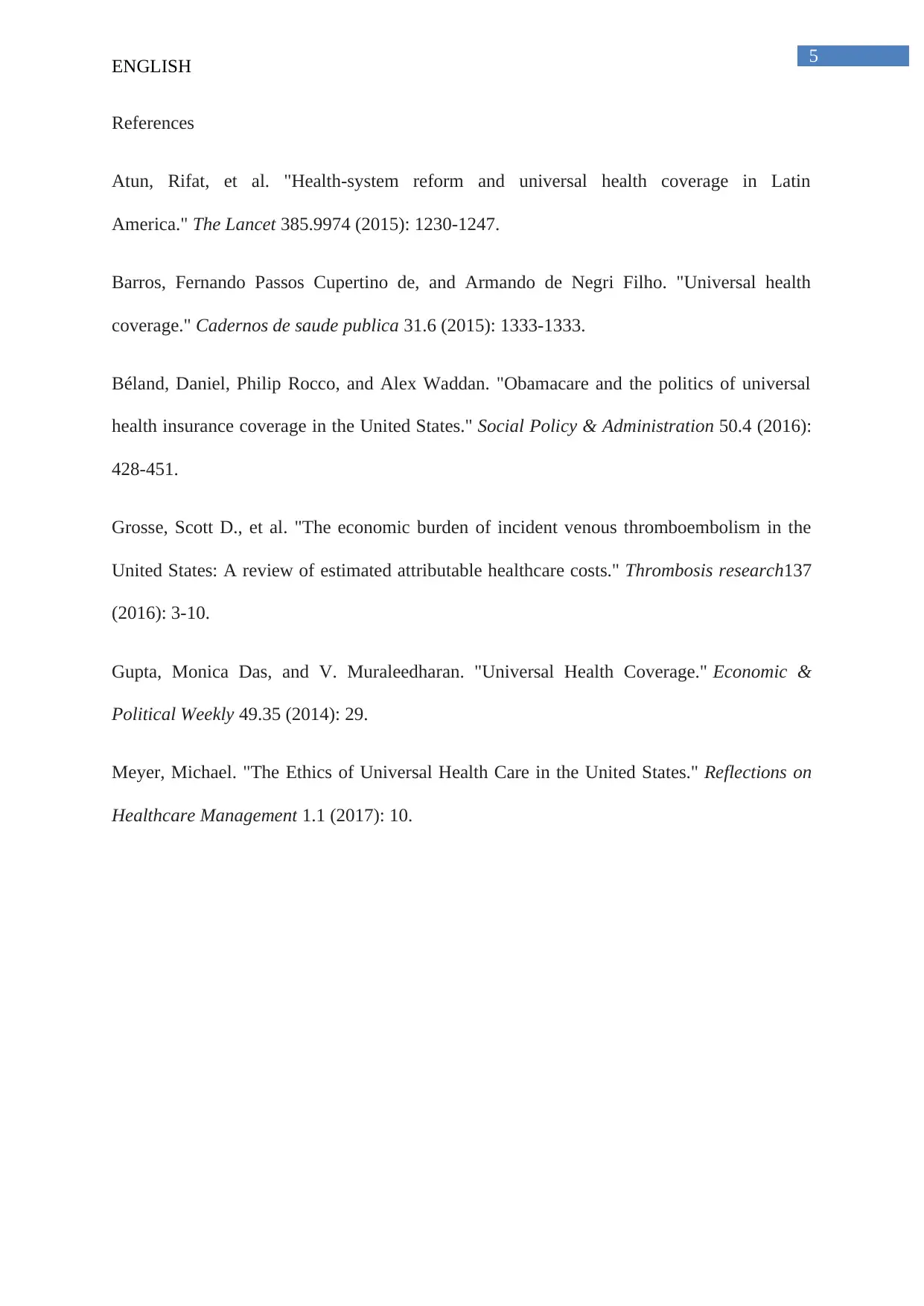
5
ENGLISH
References
Atun, Rifat, et al. "Health-system reform and universal health coverage in Latin
America." The Lancet 385.9974 (2015): 1230-1247.
Barros, Fernando Passos Cupertino de, and Armando de Negri Filho. "Universal health
coverage." Cadernos de saude publica 31.6 (2015): 1333-1333.
Béland, Daniel, Philip Rocco, and Alex Waddan. "Obamacare and the politics of universal
health insurance coverage in the United States." Social Policy & Administration 50.4 (2016):
428-451.
Grosse, Scott D., et al. "The economic burden of incident venous thromboembolism in the
United States: A review of estimated attributable healthcare costs." Thrombosis research137
(2016): 3-10.
Gupta, Monica Das, and V. Muraleedharan. "Universal Health Coverage." Economic &
Political Weekly 49.35 (2014): 29.
Meyer, Michael. "The Ethics of Universal Health Care in the United States." Reflections on
Healthcare Management 1.1 (2017): 10.
ENGLISH
References
Atun, Rifat, et al. "Health-system reform and universal health coverage in Latin
America." The Lancet 385.9974 (2015): 1230-1247.
Barros, Fernando Passos Cupertino de, and Armando de Negri Filho. "Universal health
coverage." Cadernos de saude publica 31.6 (2015): 1333-1333.
Béland, Daniel, Philip Rocco, and Alex Waddan. "Obamacare and the politics of universal
health insurance coverage in the United States." Social Policy & Administration 50.4 (2016):
428-451.
Grosse, Scott D., et al. "The economic burden of incident venous thromboembolism in the
United States: A review of estimated attributable healthcare costs." Thrombosis research137
(2016): 3-10.
Gupta, Monica Das, and V. Muraleedharan. "Universal Health Coverage." Economic &
Political Weekly 49.35 (2014): 29.
Meyer, Michael. "The Ethics of Universal Health Care in the United States." Reflections on
Healthcare Management 1.1 (2017): 10.
1 out of 5
Related Documents
Your All-in-One AI-Powered Toolkit for Academic Success.
+13062052269
info@desklib.com
Available 24*7 on WhatsApp / Email
![[object Object]](/_next/static/media/star-bottom.7253800d.svg)
Unlock your academic potential
Copyright © 2020–2025 A2Z Services. All Rights Reserved. Developed and managed by ZUCOL.




